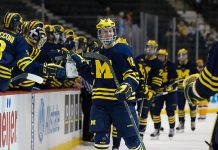Welcome back to the USCHO Hobey Watch, ladies and gentlemen. This week, I think it’s time for me to give some more serious consideration to the man who, in all likelihood, will win the Hobey Baker Award: Boston College’s Johnny Gaudreau.
That Gaudreau is the Hobey front-runner by a country mile is hardly a surprise. The New Jersey native is leading the nation in scoring average for the second consecutive season, and doing so by a wide margin, as his 64 points (30g, 34a) in 34 games give him 1.88 points per game, almost a third of a point ahead of his closest competitor, Greg Carey of St. Lawrence. I’ve made an effort to find different topics each week to avoid turning this blog into the Gaudreau Show, but it’s time to focus on the high-flying Eagles forward and put his performance this season into context.

By the way, Carey has topped his point total from last season in four fewer games and raised his points-per-game average by 0.22 (1.56 this year, compared to 1.34 a year ago). He’s also shifted roles from primary goal-scorer to distributor, with 15 goals and 38 assists this year, compared to totals of 28 goals and 23 assists in 2012-13. However, Gaudreau’s improved productivity has left Carey in the dust … along with everyone else.
Consider this: Gaudreau was the front-runner for last year’s Hobey most of the season, and despite a late-season scoring slump that coincided with BC’s early departure from the NCAA tournament, he still was part of the Hobey Hat Trick when all was said and done. His totals after 35 games last year were 21 goals and 30 assists, for an average of 1.46 PPG.
This year, meanwhile, he’s eclipsed his totals in both categories after 34 games, finishing the regular season with 30 goals and 34 assists for an average of 1.88 points per game. If you go back to my column from last March, which focused on the BC forwards who have been named Hobey Baker finalists during the Jerry York era, you’ll see that Gaudreau has carved out some truly rarified air for himself.
Of the 10 Hobey finalist seasons posted by Eagles forwards during the York era (including three by Brian Gionta), the only player who finished his season with more points than Gaudreau’s 64 is Nathan Gerbe, who ended the year as the NCAA scoring leader with 68 points. Of course, it took him 43 games to get there, and as I noted last year, he wasn’t the nation’s top scorer when the Hobey voting was done (that would be the eventual Hobey winner, Michigan’s Kevin Porter).
So I think it’s safe to say that Gaudreau has made a stronger case for the Hobey thus far than any BC forward who has come before him during York’s 20-year tenure at the Heights.
Now, here’s the fun part. To find a player who finished the season with a higher scoring average than Gaudreau’s current 1.88, you’d have to go back to 2003 and one Peter Sejna. That’s right, the biggest scoring milestone left in front of Gaudreau is the 36 goals and 46 assists that Sejna posted in 42 games.
That Sejna season is particularly noteworthy, in my opinion, because of two players whom Sejna beat out to win that year’s Hobey. One was Cornell goaltender David LeNeveu, who went 28-3-1 with a 1.20 GAA and .940 save percentage for a Big Red team that went to the Frozen Four. If there hadn’t been a scoring performance like Sejna’s that year, we might be talking about who could be the first goalie since LeNeveu to win the Hobey, and not Ryan Miller.
Of course, there wasn’t just one superlative scoring performance that year, but two. Who finished second to Sejna in the national scoring race that year? Chris Kunitz, whose 35 goals and 44 assists that season left him with a scoring average of … wait for it … 1.88 PPG, the same average currently being posted by Gaudreau. How about that, huh?
Of course, unlike Kunitz, Gaudreau won’t have Sejna — or LeNeveu — to compete with.


